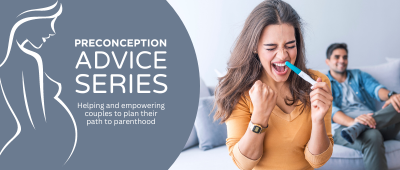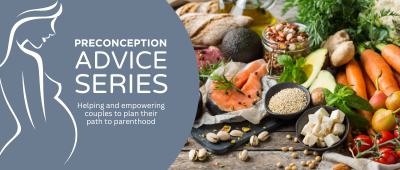Guest Blog: Written by Verity Allen (BSc, Lic Ac, BACC, MBFS)

Ever considered acupuncture for fertility? Well that depends…
If you’re new in your fertility journey then of course not! But if you’re several IVF rounds deep then you might start wondering if you’re missing something.
As an acupuncture fertility specialist of 15 years, my biggest frustration is that patients leave it too long before finding us, and one of our patients’ main frustrations is that they didn’t try acupuncture for fertility sooner. So let’s avoid the negative emotions and use acupuncture for fertility to support you earlier in your journeys.
And here’s why…
Did you know that acupuncture for fertility improves live birth outcome when used in conjunction with IVF by up to 65%? Not bad when you compare the average live birth rate of IVF alone is just 21% for women below the age of 40. (According to a 2019 systematic review and meta analysis of data collected thus far).
So why isn’t acupuncture used routinely in fertility clinics alongside IVF? Well, in clinics abroad it often is. You will find an in-house acupuncturist in many clinics in Europe, Australia and America. Unfortunately the reason you won’t find one hanging around the fertility suite in your clinic is because acupuncture for fertility has yet to receive the backing by the NHS that it is an effective treatment for fertility and this is simply because the studies to date all have their limitations. They either don’t have enough participants, or they’ve used different treatment strategies, or they’ve used acupuncture vs. sham acupuncture.
Sham acupuncture used within clinical trials is fraught with problems. In sham acupuncture a device which looks and feels like a needle is used at the acupuncture point and the practitioner “pretends” to perform a needle insertion. The problem therein lies that sham acupuncture has “consistently been shown to have greater therapeutic effects than conventional placebos.” (Langevine, 2010) Therefore, as you will see in the systematic review data, acupuncture vs sham acupuncture was shown to improve live birth rates by 52.6% and 33.3% respectively. For the study group to have been considered an appropriate representation of the norm, the researcher should have expected the placebo (sham acupuncture) group to be at 21% and as it is not, the trial is thereby rendered null and void as the researcher is perceived to have an “above average” study group.

Another key problem for the acupuncture community, is that we simply don’t have the money needed to fund trials on a larger scale, thereby attracting the volume of participants needed to legitimise the data for acupuncture for fertility. The trials to date are generally funded by the Western medical industry who have an interest in fertility. Therefore you will never find a study showing that acupuncture improves fertility as a standalone. We need to hang on the coattails of our rich fertility counterparts who are all understandably invested in IVF - since that’s all they’ve got!
However, acupuncturists across the world all see the benefits of their treatments in those patients who did opt to give acupuncture treatment a try at the start of their journeys. And I myself have seen countless successes in those of our patients who have become pregnant whilst waiting for their NHS funded IVF cycle to take place. We know that acupuncture for fertility not only improves the chance of success in conjunction with IVF but we find that it also improves the chance of success as a standalone treatment.
Research into acupuncture and fertility is such an important topic not just in putting acupuncture on the map as a legitimate and powerful tool in the world of medicine as a whole, but also in allowing women and couples to have choices when it comes to their fertile future. We will no longer feel knee-jerked into IVF because that’s all that is available.
Therefore, in my own clinics, we take collecting our data seriously and routinely run audits of our success rates. As we operate at a larger scale than a sole practitioner might, we are able to generate data with a greater number of participants. Also, as we have multiple clinics across the South of the country we are able to net participants from a wider demographic, which allows for more robustness in our data.
We’re very proud that our own statistics exceed those demonstrated in the review data and we’ve also been able to highlight the importance of the cumulative effect of multiple acupuncture treatments in the lead up to an IVF cycle, not just for women but for men also. We’ve seen sub fertile men improve their semen parameters to normal within a mere few months when we’ve combined acupuncture with supplementation and lifestyle advice.

Within this audit of our own data we were also able to show that there was a 72% pregnancy success rate for couples who weren’t undergoing IVF treatment, aged between 35-42 years. This, to me, is the important one as it gives our community hope that one day acupuncture treatment will be considered useful in improving and supporting a person’s fertility health and maybe, dare I dream, that it will be advocated by the medical community as the primary treatment modality before invasive methods are considered.
And just to twist your arms even further, another plus point of acupuncture is that it is well documented to be extremely low risk. Citing from the NHS website that “when it’s done by a qualified practitioner, acupuncture is generally very safe”. (NHS.co.uk)
So what are you waiting for?
If you would like to understand more about fertility acupuncture make your way over to our website, jam-packed with evidence based articles relating to the field. www.verityallenacupuncture.com
Fertility Acupuncture Specialists - BSc, MBACC, Lic Ac
References:
- Zhang X, Lee MS, Smith CA, Robinson N, Zhou Y, Wu Y, Mao Y-Y, Qu F (2018). Effects of acupuncture during in vitro fertilization or intracytoplasmic sperm injection: An updated systematic review and meta-analysis. European Journal of Integrative Medicine 23:14–25. [BACC website]
- Helene M. Langevine et al, Paradoxes in Acupuncture Research: Strategies for Moving Forward, 2010 [PubMed]
- NHS, Acupuncture, 28 February 2023 [NHS website]






